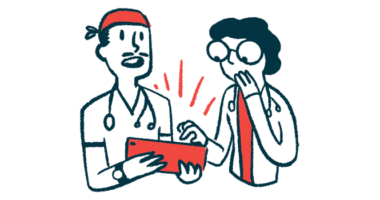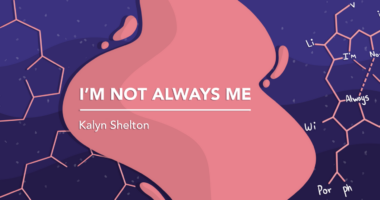‘You Should Try Yoga’: Making Peace With My Pain Despite Ableist Microaggressions

At some point, it happens to anyone who opens up about a disability or ailment: Someone will spout a wonder cure. Ableist microaggressions are pervasive in a society of quick fixes and pain phobia.
I see it everywhere: Minimize your pain with this new supplement or eliminate it altogether with meditation. But what if pain is not the problem?
I have acute hepatic porphyria (AHP), a painful inherited metabolic disorder. My pain is chronic, and it’s not a result of diet or ergonomic inadequacies. A supplement or a yoga class won’t change the fact that my liver has an extra enzyme.
Living in a society afraid of pain
A solid 90% of the time I am awake, I am in pain and fatigue akin to running 37 marathons and then being trampled by a herd of elephants. People always ask me what AHP feels like, and it really depends on the day. During an attack, it feels like my abdomen is a gourd being carved from the inside out like a jack-o’-lantern; day to day, it’s like a fleet of ninja stars is repeatedly ripping through my shoulder muscles.
It doesn’t matter if I’ve slept well lately or eaten nothing but kale smoothies with flaxseed oil every morning for the last month. Every time I post an awareness piece on Instagram about my pain, without fail, a personal trainer/life coach/amateur nutritionist will suggest a new diet or supplement to cure my pain. It’s wonderful this product worked for your uncle’s best friend and now he competes in triathlons, but does your supplement reprogram DNA? Because I have a genetic diagnosis. Would you ask someone who can’t walk and uses a wheelchair if they’ve just tried a different pair of shoes?
All vibes welcome
Wellness communities market this “good vibes only” idea, repressing the full spectrum of human emotions and placing value solely on positive feelings. Certainly there’s wisdom in optimism, but when everything is great all the time, what is learned? I refuse to be shamed into positivity on my bad days. Grieving and sadness are essential for processing the day-to-day trauma of living in my body.
The toxic positivity Instagram users peddle on their grids reflects spiritual bypassing and the shiniest parts of the wellness industry. Built on a foundation of privilege and ableism, this community capitalizes on aspirations of feeling good all the time. It feeds on those with means, promising products to make life better.
Instagram didn’t give birth to shiny, happy wellness communities, but when I log in they are front and center in my daily life. A trigger for self-judgment, they serve as yet another reminder that I’m not “enough” because I live with a painful disability.
I post about my life to raise awareness, add perspective, and build connections for others in the rare disease community who feel isolated. When I open up about my challenges, I’m not seeking pity. My body is definitely not a problem that needs to be solved.
Lately, I’ve avoided Instagram altogether, and I’m OK with it. Someday, I’ll be able to sift through wellness content to find value. Someday, I’ll develop the perfect response for bots trolling the “chronic illness” hashtag and maybe my comment will be a teaching moment for an observant follower. For now, I have to take care of me.
Making peace with pain
I have to walk alongside my pain in a world that’s demonized negative sensations. Our society doesn’t value sitting in discomfort, but my pain is a central part of my day-to-day existence and that’s not a bad thing.
When I received a chronic AHP diagnosis, I let go of the idea I would ever live a life without physical pain. It’s not a healthy expectation for me. I function day to day in pain that may be perceived as intense to others, but it’s become a baseline. The surest way to enhance my pain is to run from it, to resist.
My daily meditation practice is critical for my well-being. While it hasn’t eliminated pain, mindfulness has transformed my approach and increased my mental capacity for pain management. Body scan meditations help me cut through the shame and notice my body’s cues so I can respond in healthy ways. Self-compassion meditations remind me to be gentle and loving on days my pain and fatigue are overwhelming.
There were times in my pre-diagnosis life I was snared in the nets of the wellness industry, shelling out resources to lessen my pain burden, all while judging others who relied on prescription medication. I get the appeal, but for those of us with systemic reasons for our pain, we can begin making peace with our bodies by opening up to all the vibes, not just the good.
***
Note: Porphyria News is strictly a news and information website about the disease. It does not provide medical advice, diagnosis, or treatment. This content is not intended to be a substitute for professional medical advice, diagnosis, or treatment. Always seek the advice of your physician or other qualified health provider with any questions you may have regarding a medical condition. Never disregard professional medical advice or delay in seeking it because of something you have read on this website. The opinions expressed in this column are not those of Porphyria News or its parent company, Bionews, and are intended to spark discussion about issues pertaining to porphyria.







Aaron J Edwards
Thank you! I have chronic pain due to foot deformities. Diet and exercise might help me loose weight, which might down my pain levels, but the pain will always be there no matter how healthy or unhealthy I might be. When people say “try acupuncture or yoga” I die a little inside. The pain would still be there even if I can’t feel it, and often times manifests itself in other ways.
Anyways, it really helps when I read about the lives of others with chronic pain.
Claire Richmond
Yeah, it's so invalidating of the emotional and psychological toll chronic pain takes on our bodies. Thanks for reading, Aaron!